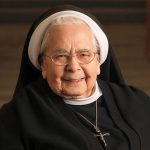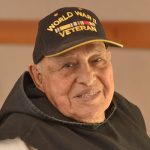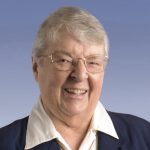Stories & News
Meet some of the women and men who benefit from the Retirement Fund for Religious.
Sister Clare Vandecoevering, SSMO, 88

“I loved those little children,” says Sister Clare Vandecoevering, 88, of the students in her first teaching assignment. “They were precious.” A member of the Sisters of St. Mary of Oregon, she spent more than five decades in the classroom. Yet in all those years, her love for students never wavered—a devotion flowing from her deep faith in Jesus.
Born in Verboort, Oregon, Sister Clare is from a devout Catholic family with 14 children. “My real religious vocation came from my father,” she says. “He was very devoted. Every night, he would lead our family in the Rosary.” Growing up, Sister Clare was taught by the Sisters of St. Mary of Oregon, and she had an aunt and several cousins who were members. Together with her father’s example, they inspired her to join the community. Sister Clare also has two younger sisters, Agnes Marie and Ann, who are members. “They both joined, and I didn’t tell them to,” she says. “They just came on their own!”
Sister Clare entered the novitiate on her 16th birthday, finishing high school with her community. Following graduation, an older member mentored her in teaching. “Sister Stanislaus was excellent,” Sister Clare remembers. “She worked with me for a whole year.” After her training, Sister Clare spent five years teaching Native American children on the Grand Ronde Reservation. She then obtained a bachelor’s degree in education at Marylhurst College (now Marylhurst University) and later pursued additional coursework at various institutions, including Mt. Angel Seminary.
For more than 50 years, she ministered at numerous locations in Oregon and Washington, alternating between teaching elementary school and religious education, including adult formation. “I loved religion, so I became a religion teacher too,” she says. Much of her ministry was carried out in her hometown of Verboort, serving at the local parish and Catholic school and living with her two sisters in the convent there. The three spent many summers offering religious vacation school.
“Oh, that was the best thing of all,” she says. “The day we gave out report cards, we’d jump in the car and drive all over Oregon and Washington. We had a special weeklong program. Instead of separating the children by grade, we had them all together. We’d have an older girl between two younger boys, so we didn’t have any discipline issues. We went to places that had never had sisters. We just loved it. It was hard to give that up!”
At age 76, health challenges required her to begin teaching half days. In the afternoons, she would help organize Verboort’s archives.
“Now we’re home here at St. Mary’s,” says Sister Clare, who retired at age 85 and returned to her community’s motherhouse. “It’s a blessing that I have my two sisters here with me, and people are so good to us. So many come around to visit.”
Throughout 70 years of religious life, prayer has been her anchor. “Prayer is very important to me,” she says. “Being with God, being present to him—it’s the main part of the day for me.”
Brother Martin Gonzales, OCSO, 93

“After the war, a lot of men were looking for peace,” says Brother Martin Gonzales, a World War II veteran and a Trappist monk from Our Lady of Guadalupe Abbey in Carlton, Oregon. “I remember reading an article in Reader’s Digest about veterans joining monasteries.”
Born in 1925 in La Mesa, California, Brother Martin grew up during the Depression. His family got by as best they could, but times were hard. When he was 11, his family moved to San Diego, where Brother Martin was very involved with his local parish. “In a peasant Mexican family, religion is part of your life,” he says. A Knights of Columbus scholarship allowed him to spend his junior and senior years at a private, Catholic high school. After graduation, he went to work at an aircraft plant.
In 1943, at age 18, Brother Martin was drafted. Following basic training, he was assigned to the 1st Cavalry Division. He served in numerous campaigns in the Pacific Ocean theater, earning a Silver Star for his bravery during the Battle of Los Negros in the Admiralty Islands. Later, in November of 1944, his unit ran into trouble fighting in the mountains of Leyte, an island in the Philippines. “My troop was pinned down in a ridge we nicknamed “Starvation Ridge” because no food or supplies could get through,” says Brother Martin.
After fighting in the Philippines, his unit began training for what was thought would be the final battle of the Pacific, the invasion of Japan. Brother Martin was assigned to carry a flame thrower and scheduled to be among the first wave of soldiers to invade the mainland. Sixty percent of those in the first assault were expected to die. Shortly before the scheduled attack came news that Japan had surrendered.
“On August 15, 1945, as we were getting ready to load on invasion troop ships, the miracle of V-Day, the end of World War II, changed our plans,” recalls Brother Martin. “That was one of my happiest moments—when the war was over. I can’t put it into words. I said to God, ‘You’re going to give me a chance!’”
After returning from the war, he spent several years trying to find his path. “I did some hard searching,” Brother Martin says. He worked various jobs and attended a semester of college. He dated. “Coming back after the war was a struggle. There was always this attraction to religious life, but I thought you had to be a saint or an angel.
“On June 13, 1951, during a most difficult time, I went to my parish, Our Lady of Guadalupe in San Diego, California, to seek some help. I was warmly received by a wise and holy Jesuit priest, Father Arthur Spearman, whom I had met at Loyola University. After hearing my story and my confession, he said, ‘I think you have a religious vocation.’”
Brother Martin entered Our Lady of Guadalupe Abbey, which was then located in New Mexico, on May 29, 1952. “Being Mexican, you’ve got Our Lady of Guadalupe in your blood,” he says. In 1955, the community moved to Carlton, Oregon, and Brother Martin was among the founding members to establish the current abbey. The early years of solitude were a struggle for him. “In those days, the monastery was very strong on silence,” he explains. “I was in charge of the chicken house. I spent hours talking to the chickens!” Over the years, Brother Martin has served his community in a variety of capacities, but his primary work has been in the guest house, where he continues on a part-time basis today. “I’ve always had a talking job,” he laughs.
He says the lessons of the Baltimore Catechism that he learned as a child have sustained him throughout his life. “I was taught that God made you to know him, love him, and serve him in this world and to be happy with him forever in the next,” Brother Martin summarizes. “This (monastery) is the best place for me to do that.”
Sister Joan Pokorny, OSB, 78

“Nature is my healing place,” says Benedictine Sister Joan Pokorny, 78. “It’s where I am most myself.” Growing up on a farm in Oakridge, Oregon, she felt a bond to the wonders of creation at an early age.
“My mother started telling me that I was going to be a sister when I was 4 or 5. I even had a nun doll,” Sister Joan recalls. “And I thought it would be a nice thing to do because I was always caught up in the mysteries around me. But, oh, I still grappled with it. Even coming to the convent, I was sort of dragging my feet. And then I got here and thought, ‘It’s a match!’ When I came, we had cows, chickens, pigs, and a big barn. We had gardens and acreage. It was a big miracle that God put me here.”
In 1962, Sister Joan entered the novitiate of the Benedictine Sisters of Mt. Angel in Mt. Angel, Oregon. She had just graduated from Mt. Angel College, where she trained as a teacher. Sister Joan spent a total of 34 years teaching—24 years in parochial schools and another 10 in public schools, mostly at the junior high school level.
Following teaching, she turned her focus to spiritual direction and began ministering at Shalom Prayer Center, her community’s retreat center. For some 20 years, she gave retreats and served as a spiritual director. She also coordinated a training program for spiritual directors. “My community is monastic,” she explains. “We pray at different times throughout the day and have daily Eucharist. This is a very rich place for spiritual growth.”
Although Sister Joan has retired from full-time ministry, she remains active with the Shalom Center. She continues to serve as a contact for those seeking spiritual direction and as a mentor for those in training. “A big part of my ministry is being a resource person—someone people can talk to if they run into an issue or need someone to bounce ideas off of,” she says. Sister Joan also makes sure the retreat center gift shop is stocked with helpful books and materials. “I belong to Spiritual Directors International, and I keep up with trends and changes,” she says. “I also follow the news and read different materials on my computer.”
After 56 years in religious life, Sister Joan stays true to her roots. “I spend a lot of time in nature, being still,” she says. “My peace is in encouraging people to be quiet and to have time for reflection. I pray a lot, and I do believe in miracles. They’re not a cliché.”